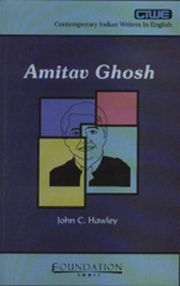Book contents
- Frontmatter
- Contents
- Series Editor's Preface
- 1 The Writer, his Contexts and his Themes
- 2 A Writer Situated in a History and in a Place: Ghosh's Non-fiction
- 3 A Tale of Two Riots: The Circle of Reason and The Shadow Lines
- 4 The Ebb and Flow of Peoples across Continents and Generations: In An Antique Land, The Glass Palace, The Hungry Tide
- 5 Subaltern Agency as Fiction or Science: The Calcutta Chromosome
- 6 Beyond the Commonwealth: Amitav Ghosh and Indian Writing in English
- Topics for Discussion
- Bibliography
2 - A Writer Situated in a History and in a Place: Ghosh's Non-fiction
Published online by Cambridge University Press: 26 October 2011
- Frontmatter
- Contents
- Series Editor's Preface
- 1 The Writer, his Contexts and his Themes
- 2 A Writer Situated in a History and in a Place: Ghosh's Non-fiction
- 3 A Tale of Two Riots: The Circle of Reason and The Shadow Lines
- 4 The Ebb and Flow of Peoples across Continents and Generations: In An Antique Land, The Glass Palace, The Hungry Tide
- 5 Subaltern Agency as Fiction or Science: The Calcutta Chromosome
- 6 Beyond the Commonwealth: Amitav Ghosh and Indian Writing in English
- Topics for Discussion
- Bibliography
Summary
Dancing in Cambodia, At Large in Burma (1998), Countdown (1999); Ghosh's afterword to Chan Chao's book of photography, Burma: Something Went Wrong (2000), and The Imam and the Indian: Prose Pieces (2002)
This chapter considers Amitav Ghosh's non-fictional writing. Viewed together, the collected essays demonstrate his chief concerns:
The nuclearisation of the subcontinent (Countdown; The Ghat of the Only World)
The current political crisis in Burma and Cambodia (Dancing in Cambodia, At Large in Burma; The Global Reservation; Burma: Something Went Wrong)
The maintenance of cultural heritage (Dancing in Cambodia; The Hunger of Stones; The Human Comedy in Cairo)
Pre-European commerce between India and Africa (The Slave of MS. H.6)
Fundamentalism (The Imam and the Indian; An Egyptian in Baghdad; The Fundamentalist Challenge)
Anthropology and Economics in local communities (Categories of Labour and the Orientation of the Fellah Economy; The Relations of Envy in an Egyptian Village)
The Diaspora (The Imam and the Indian; Tibetan Dinner; The Diaspora in Indian Culture) The March of the Novel Through History)
Viewed with a less narrow focus, many of these pieces share in common the author's abiding concern for the impact of broad historical movements on individuals caught up in events beyond their control, the importance of connections between the past and the present, and the desirability of finding avenues for communication that obviate nationalistic manias.
It is unusual for a novelist to produce as rich a body of essays as Amitav Ghosh has.
- Type
- Chapter
- Information
- Amitav GhoshAn Introduction, pp. 18 - 45Publisher: Foundation BooksPrint publication year: 2005

